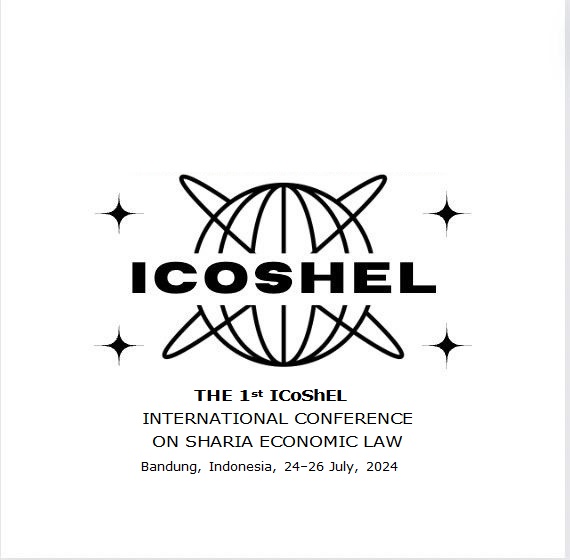Innovation in Distribution of Wealth Through Zakat: Building Shared Prosperity by Applying Tafsir Qs. At-Taubah Verse 60
DOI:
https://doi.org/10.47766/alhiwalah.v3i1.2568Keywords:
Inovasi, Distribusi, Zakat, Kesejahteraan, Penafsiran.Abstract
Whether it is recognized or not, there are many things in society problems related to the economy,especially not equal distribution of income between one group and another others that cause social and economic disparities.To overcome this problem, zakat is the obligation of every Muslim for those who have fulfilled the requirements to accomplish this, become an alternative solution for overcome this problem. In this case distribution Zakat funds are the most important part of building shared prosperity. But in this era of globalization of course. The distribution of zakat requires new innovations through application of QS interpretation. at-taubah verse 60 effectively, efficiently and relevant to the development of the times by doing various collaborations and modern distribution models. Tree The discussion in this article is the application of QS interpretation. At-Taubah verse 60 which emphasizes the concept of caring, justice and economic equality by combining new innovations to create a more effective system in building economic prosperity, of course can be realized by applying eight groups mustahiq who has the right to receive and utilize funds zakat.
References
Az-Zuhaili, Wahbah “Tafsir Al-Munir”, Dark Al-Fikr Al-Mu’assir, Damaskus, 1418.
Ahmad Mustofa Lutfiyanto, Pengembangan Inovasi Zakat Berbasis Digital Pada Lembaga Amil Zakat Infaq Dan Shadaqoh (Zakat Inklusif), “Jurnal Kajian Islam Kontemporer”, Vol.1, No.1, 2020.
Al-Qardhawi, Yusuf. “Fiqih Az-Zakah” (Beirut: Mu’assasah Ar-Risalah, 1991),Hal 547.
Afiq Bin Pahruddin, Muhammad. “Criteria Asnaf Gharim Sebagai Mustahiq Zakat Menurut Fiqih Islam (Kajian Di Lembaga Zakat Selangor, Malaysia)”, Banda Aceh, 2022.
Ariandini, Rafika. Pribumisasasi Islam Dalam Tafsir Al-Azhar Pada Qs. At-Taubah Ayat 60 Tentang Mustahiq Zakat, “Maghza: Jurnal Ilmu Al-Qu’an Dan Tafsir”, Vol.4, No.2 (2019): 232-248.
Cyintia, Rizka Dkk. Analisis Pendistribusian Zakat Profesi Untuk Beasiswa Pendidikan (Studi Kasus Baznas Kota Denpasar), “Jurnal Nirta: Studi Inovasi”, Vol.2, No1 (2022): 50-65.
Farina, Dita. Manajemen Zakat Di Indonesia Sebagai Pemberdayaan Ekonomi Umat, “Ekbis: Jurnal Ekonomi Dan Bisnis”, Vol.2, No.2, (2020): 201-212.
Fandi Atmaja, Fajar dkk. Pelatihan Pengelolaan Aplikasi Digital Untuk ZISWAF Di Jaten Sendangadi Malti Sleman, “Jurnal Pengabdian”, Vol.14, No. 1, (2023): 181-187.
Hasan, Zaenol. Persepektif Maqoshid Al-Syari’ah Tentang Pendayahgunaan Dana Zakat Untuk Membiyai Infrastruktur, “Jurnal Ekonomi Dan Hukum Islam”, Vol 6, No.2 (2022): 101-116.
Imam Jazuli, Ahmad. Makna Fisabilillah Sebagai Mustahiq Zakat Studi Komparasi Antara Ahlus Sunnah Wal Jam’ah Dan Wahabi, “Journal Of Islamic Bussines Law”, Vol. 5, No.1 (2021).
Ilyas Abbas, Mohammad Dkk. Inovasi Sitem Informasi Manajemen Zakat, Infaq, Dan Sedekah Lazizmu Gorontalo, “Jurnal Riset Sains Dan Tekhnologi”, Vol. 6, No.2, (2022): 79-84.
Intan Itsnaini, Putri dkk. Strategi Pengembangan Kewirausahaan Asnaf Fakir Dan Miskin Melalui Bantuan Modal Zakat Yayasan Dana Sosial Al Falah (YDSF) Surabaya, “El-Qist: Journal Of Islamic Economics And Bussines”, Vol.7, No.1 (2017): 1377-1389.
M. Yusuf, Kadar“Tafsir Ayat Ahkam”, Riau: Amzah, 2013, Hal 82.
M. Haidir, Revilitasi Pendsitribusian Zakat Produktif Sebagai Upaya Pengentasan Kemiskinan Di Era Modern, “Muqtasid: Hurnal Ekonomi Dan Perbankan Syari’ah”, Vol. 10, No. 1 (2019): 57-68.
Rahman, Miftahur. Peran Zakat Dalam Mengentaskan Kemiskinan Di Indonesia, “Jurnal Hukum Islam”, Vol.19, No.2 (2019): 130-148.
Risky Dermawan, Muhammad dkk. Multi-Platform Based Financial Statement Report Repository System At Upt.Ptph North Sumatra, “Jurteksi: Jurnal Tekhnologi Dan System Informasi”, Vol. Ix, No. 1(2022): 15-24.
Rahmaniyah, Wasilatur. Optimalisasi Zakat Digital Melalui Penguatan Ekositem Zakat Di Indonesia, “Jurnal Al-Huquq”, Vol.3, No.2 (2022): 232-246.
Ridha, Ahmad. “Peranan Pengelolaan Zakat Dalam Meningktakan Kualitas Pendidikan Mustahiq Studi Kasus Di Badan Amil Zakat Kecamatan Ujungberung Kota Bandung”, Bandung, 2018.
Suryadi, Andi. Mustahiq Dan Harta Yang Wajib Dizakati Menurut Kajian Para Ulama, “Journal Tazkiya”, Vol.19, No.1 (2018): 1-12.
Sunaryo, Deni. Pemberdayaan Literasi Keuangan Sebagai Pemenuhan Informasi Pemahaman Kebutuhan Umkm Di Kecamatan Serang Kota Serang Banten, “ Jurnal Pengabdian Kepada Masyarakat”, Vol. 2, No.3 (2022): 4215-4222.
Septiani Rahajeng, Mardatilla Dkk, Bentuk-Bentuk Kemitraan Pemerintah, Swasta Dan Masyarakat Dalam Upaya Keberlanjutan Program Penataan Lingkungan Permukiman Berbasisis Komunitas (Studi Kasus: Kabupaten Kendal Dan Kota Pekalongan”, (Penkalongan, 2017), “Jurnal Pengembangan Kota”, Vol. 3, No.2 (2017): 112-119.
Zulhamdi, Zulhamdi. “Urgensi Lembaga Amil Zakat & Perkembangannya Di Aceh.” Al-Muamalat 1, no. 2 (2016). https://doi.org/https://doi.org/10.32505/muamalat.v1iII.607.
Zainuddin dkk, Praktik Distribusi Zakat Padi Berdasarkan Korelasi Suroh At-Taubah Ayat 60 Di Kecamatan Indrapuri Kabupaten Aceh Besar, “Tafse: Journal Of Qur’anic Studies”, Vol. 7, No. 2 (2022): 233-244.
Zulhamdi, Zulhamdi. “Problematika Pengelolaan Zakat Pada Baitul Mal Aceh.” Sarwah: Journal of Islamic Civilization and Thought 16, no. 1 (2017). https://ejurnal.iainlhokseumawe.ac.id/index.php/sarwah/article/view/129
Downloads
Published
Issue
Section
License
Copyright (c) 2024 Uswatun Hasanah, Harisah

This work is licensed under a Creative Commons Attribution-NonCommercial-ShareAlike 4.0 International License.







